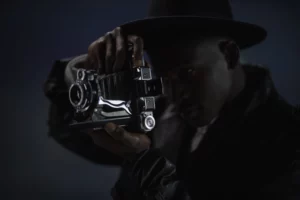Have you ever wondered if hiring a private investigator is actually legal? With private eyes featured in Hollywood blockbusters and detective novels, you might be curious about what real-life PIs can and cannot do. Can they spy on people? Dig up private information? Go undercover? While television makes investigative work seem extremely exhilarating, the reality is a bit less glamorous. Still, within reasonable bounds, private investigation is legal in most parts of the world.
This guide will cover key questions like:
- What do private investigators actually do?
- Is private investigation legal where you live?
- What activities are PI’s allowed to engage in?
- What tactics would be illegal or unethical?
- How can you ensure your private eye follows regulations?
Let’s start by explaining exactly what services private investigators offer.
Defining the Work of Private Investigators

Private investigators, often abbreviated as PI’s, offer investigative services to private citizens, lawyers, corporations, insurance agencies, and other clients who have unanswered questions they aim to get to the bottom of. Their work is more mundane than detective dramas would suggest. So what do they actually do on a daily basis?
Gathering Information
A core duty PIs take on is gathering information about people, events, assets, background histories, and more. For example, an employer might hire them to look into a prospective employee’s past, or an individual may need help finding a long lost relative. Gathering the needed information is the first step.
Conducting Surveillance
PIs also regularly conduct surveillance work like monitoring activities or performing stakeouts to gather facts. For instance, they might stake out an accident scene or suspected insurance fraud scenario. Or a client may hire the PI to trail a cheating spouse to marital infidelity occurring after work hours. Surveillance helps uncover the truth.
Compiling Evidence
Another large aspect of the job is compiling evidence. Private investigators interview witnesses, take statements, collect documents, assemble proof for courts, and prepare detailed reports of their findings for clients wishing to take legal action. Thorough evidence gathering is vital.
Accessing Records
To augment evidence, PIs also search volumes of public and private records looking for clues. They comb through sources like telephone directories, criminal records, court documents, state motor vehicle registrations, corporation records, bank files, and more. Database access helps turn up leads.
Specialties
While all private detectives have the basic skill set of investigating and compiling information, some niches exist within the profession as well. For instance, many PIs develop specialties in areas like computer forensics, financial investigations, surveillance technology, or competitive intelligence. Narrowing one’s focus allows greater mastery over unique investigation types clients request.
Now that you know precisely what a private investigator does, the next question on your mind is likely—is what they do even legal?
Understanding PI Legality Around the World
With private investigators digging through personal information and monitoring private citizens, reasonable concerns exist around investigator legalities. Fortunately, in most parts of the world, private investigation itself is perfectly legal, albeit with some restrictions. Here is an overview of private investigator laws by region:
North America
- In the United States, private investigation is legal in all 50 states, but most have PI licensing requirements dictating professional qualifications and investigative boundaries. Only Idaho, Mississippi, Alaska and South Dakota currently have no PI regulations. However, some general guidelines apply:
- In public places, PIs can legally observe and photograph others without permission. They can also follow targets around in public.
- Private investigators cannot trespass onto private property without the owner’s consent. Trespassing is illegal.
- Wiretapping phone calls and bugging private property is strictly forbidden without a court order.
- PIs cannot harass or threaten their targets. Stalking and intimidation tactics would face criminal penalties.
- Breaking and entering, theft, or physical assault are obviously illegal.
- Impersonating others to deceive a target is illegal in most states.
- Accessing private records through false pretenses is not allowed. PIs cannot lie to gain access to records.
- Canada also allows private investigation by licensed PIs adhering to provincial laws. Regulation exists in all Canadian territories.
South America
- Private investigation is legal throughout South America as well, but less formal licensing requirements exist outside of Colombia, Argentina, Panama and select other countries with more mature regulations.
Europe
- The United Kingdom permits private investigation under voluntary self-regulation guided by The Security Industry Authority and Association of British Investigators, as no formal legal framework governs it.
- Private investigation is legal across continental Europe as well. Many countries allow it under ministry regulations, though restrictions exist regarding full background investigations. Data privacy laws also come into play heavily throughout Europe.
Asia and Oceania
- Private investigation is legal across most of Asia and Oceania. India, Hong Kong, Thailand, Australia and New Zealand all permit private eyes with country-specific restrictions against trespassing, breach of privacy, harassment, etc. Less formal regulations cover Asian countries like Indonesia, Philippines and Vietnam.
So in summary—yes, private investigation itself is broadly legal across the globe! But what specific activities can investigators legally engage in? And which tactics would be crossing the line? Let’s clarify next.
Legal vs. Illegal Investigative Activities

While private investigation services mostly operate legally, limits on specific investigative activities exist to maintain privacy rights, gather evidence ethically, avoid harassment, etc. PI’s must avoid crossing boundaries into illegal territory.
Legal Activities
Green-lit forms of investigation private investigators can utilize include:
- Surveillance in public locations
- Searching public records databases
- Interviewing cooperative witnesses
- Taking photos/videos in public
- Analyzing financial statements or digital forensic evidence willingly shared by a client
- Using deception or pretexting to encourage voluntary disclosure of information
- Researching background history through legal channels
Illegal Activities
Prohibited PI activities crossing legal lines include:
- Wiretapping phones without consent
- Tracking vehicles without permission
- Trespassing onto private property
- Stealing documents or computer files
- Harassing through threatening tactics
- Impersonating law enforcement
- Misrepresenting credentials or services
- Hacking emails, bank accounts, or restricted databases
The key differentiator separating lawful investigation from unlawful encroachment of rights comes down to respecting privacy, obtaining voluntary consent when possible, conducting reasonable records searches only using legitimate channels, and avoiding trespassing or illegal surveillance.
Understanding boundaries takes experience. That’s why proper training matters greatly in this profession.
Real-Life PI Examples Showing Legal vs. Illegal Activities
To drive home the nuance between ethical investigation versus unethical encroachment of legal boundaries, have a look at these real-life examples:
Legal Example
Maria suspects her husband Jose is having an affair with a co-worker at his accounting firm. She hires a licensed private investigator to gather evidence and report back findings.
The PI surveils Jose discreetly by sitting in public areas outside his office, never trespassing onto private property. He searches public records showing Jose booked a hotel room near his workplace, accesses recent restaurant charges indicating two guests at intimate locations, and identifies his suspected mistress by discreetly snapping photos around the office.
After compiling a detailed report with Maria’s voluntary phone records plus public database findings, she has the evidence needed to confront Jose regarding workplace infidelity occurring during business hours—without the PI using illegal wiretaps, trespassing, or misrepresenting himself.
Illegal Example
An investor hires a private investigator named Bill to investigate a business partner he believes is embezzling funds from their corporation.
Bill breaks into the partner’s home to clone his laptop hard drive and steal financial documents. He also impersonates an IRS officer meeting with their corporate accountant to pressure release of supposedly stolen records.
By trespassing and encroaching privacy rights through stealthing tactics, Bill clearly violated legal boundaries despite gaining evidence to prove the partner’s crime. His employer can face lawsuits over the illegal surveillance tactics.
These examples showcase why ethics and respect matter greatly in investigation work. Investigators must uphold rights while searching for truth using above board tactics. Otherwise, unlawfully obtained material gets thrown out of court.
Ensuring Your Private Investigator Follows Regulations

If you want to hire a private investigator, it is wise to retain someone operating legally using proper protocols. Here are tips for vetting an ethical private investigator:
Verify Licensing
- In locales requiring licenses, check that your PI has up-to-date credentials in good standing. This demonstrates completion of approved training programs on regulations.
Conduct Thorough Background Checks
- Search online reviews and contact references to confirm they conduct lawful investigations without client complaints.
Require a Written Service Agreement
- Have an agreement explicitly outlining the specific information you are requesting, ensuring the methods align with legal parameters around surveillance, information access, etc.
Specify Legal Methods
- Make clear from the outset all investigation should use above-board legal tactics only. Make no room for unlawful behavior with vague directives open to interpretation.
Avoid Shady Characters
- Watch that the PI does not skirt questions about methods or make unrealistic promises requiring illegal shortcuts. This signals loose ethics.
There Are Consequences for Breaking the Law
Those who cross legal lines face harsh consequences if caught:
- Criminal charges – Illegal surveillance, trespassing, wiretapping, and other offenses can lead to misdemeanor or felony charges. Investigators may serve jail time.
- Civil lawsuits – Victims who have their privacy violated by unlawful investigators can sue for damages.
- License revocation – State regulatory agencies will revoke or suspend the licenses of PIs who break the rules. This prevents them from working legally.
- Reputational damage – News of illegal acts can ruin a private investigator’s reputation and tank their business. Clients avoid firms known for unethical practices.
For private eyes who play by the rules, the licensing requirements, privacy laws, and ethical codes are there to give their profession legitimacy. But PIs who cut corners and break laws defeat the purpose of regulation. They fail to protect individual rights.
Underground Investigators Operate Illegally

While the majority of private investigators follow proper procedures, an underground industry exists that flouts the law:
- Unlicensed PIs – These investigators conduct illegal surveillance, use harassment, or impersonate people despite having no license permitting their work.
- Rogue ex-police – Former police officers sometimes become private eyes who believe they are above the law. They may abuse tools like databases and lie detector tests.
- Malicious PIs – Some rogue investigators specifically work on cases meant to discredit, extort, or harm innocent targets. They will use illegal tactics without restraint.
- Private spies – These investigators might be hired to gain corporate intelligence through illegal wiretaps, hacking, theft, and other acts of espionage.
- Predatory PIs – A very small number of private investigators are essentially stalkers-for-hire. They threaten, blackmail, and physically endanger people.
This unlawful minority gives the rest of the industry a bad reputation. But when legal investigators band together to expose corruption, it helps clean up the field. Professional associations like the California Association of Licensed Investigators (CALI) try to set standards through policy advocacy and ethics training.
The public can also check licensing databases to verify their private eye is above-board. Be wary of any PI who talks about bending rules or “operating in the gray area.” If an investigator’s tactics seem invasive or illegal, avoid hiring them at all costs.
Evolving Ethics in Tech-Based Investigations
Moreover, the increase in technology-enabled investigations poses new ethical dilemmas:
- How acceptable is covert DNA testing without informed consent? Should investigators be allowed to retrieve suspects’ DNA from discarded items like hair or cigarettes?
- Is installing malware or compromising devices like smart home hubs going too far, even if legal? At what point do such actions become unethical invasions of privacy?
- Does the use of emotion recognition, micro expression analysis software, and similar biometric tools on subjects without their knowledge violate ethical principles?
- As machine learning algorithms and predictive analytics enter the investigative toolkit, how cautious should PIs be about potential biases and false positives leading to inaccurate profiling?
These types of emerging issues sit in a gray zone today but could be addressed through future regulation or professional standards. For now, individual investigators must make tough judgement calls. As technology becomes more intrusive, it may spark reassessment of ethical boundaries in the profession.
Anti-Surveillance Technologies

And it’s not just barriers to accessing data that investigators must worry about – subjects themselves are getting more adept at evading surveillance. Apps that detect phone tapping, disclaimer services that remove personal information from data brokers, GPS spoofing tools that provide false location data, and similar technologies all enter the mainstream. This gives savvy individuals extra layers of protection.
Here’s one scenario illustrating the challenge: a wife hires a PI to follow her husband and confirm if he’s having an affair. But the husband installed a hidden camera detector app, uses burn phones for communicating discretely, and travels in rideshares that use randomized routes. Outmaneuvering these countermeasures would require exceptional skill from the investigator.
Essentially, the days of overly relying on trailing targets in the open are ending for two reasons: the mainstreaming of privacy technologies, and the public’s increasing surveillance literacy. Investigators must continue honing more specialized skills to overcome these roadblocks.

